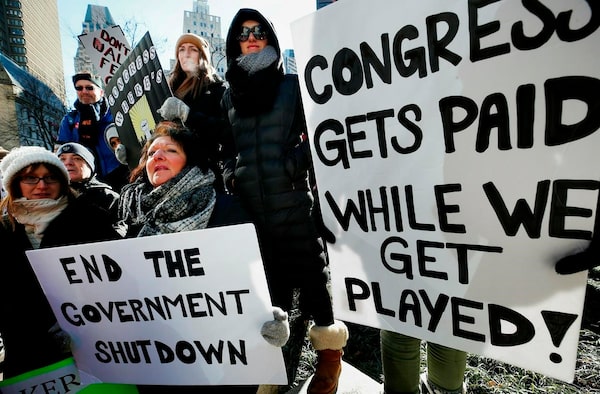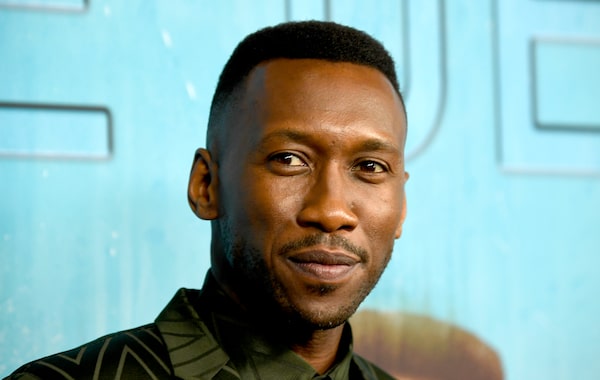Good evening, lots happening today. Here’s your Friday evening update:
WHAT YOU NEED TO KNOW
Prime Minister Justin Trudeau confirmed this afternoon that a young Saudi woman who is fleeing her family has been granted asylum in Canada. The Prime Minister, who’s in Regina today for a series of pre-election town halls, told reporters that the United Nations Human Rights Commission (UNHCR) asked the Canadian government to allow 18-year old Rahaf Mohammed al-Qunun to come to Canada.
As Ottawa Bureau Chief Robert Fife and Asia Correspondent Nathan VanderKlippe in Beijing report, Ms. al-Qunun had sought asylum in Thailand last weekend. She had been with her family in Kuwait and had fled that country for Australia, via Bangkok. Ms. al-Qunun was stopped at a Bangkok airport last Saturday by Thai immigration police who denied her entry and seized her passport. She then barricaded herself in an airport hotel room and launched a social-media campaign through her Twitter account that drew global attention to her case.
Canada will accept her as a refugee. She chose to go to Canada.
— Thai immigration chief Major-General Surachate Hakparn
The decision to grant her asylum is likely to cause a further strain in relations with Saudi Arabia. In August, Saudi Arabia withdrew its envoy in Ottawa, expelled the Canadian ambassador, suspended Saudi state airline flights to Toronto and pulled out thousands of students and medical patients from Canada.
The diplomatic dispute began when Canadian Foreign Affairs Minister Chrystia Freeland tweeted concerns about the news that several social activists had been arrested in Saudi Arabia.
This is the daily Evening Update newsletter. If you’re reading this on the web, or it was forwarded to you from someone else, you can sign up for Evening Update and more than 20 more Globe newsletters on our newsletter signup page.

Government workers and their supporters hold signs during a protest in Boston on Friday.The Associated Press
U.S. House passes bill on back pay for federal workers as shutdown continues
It’s payday for federal workers in the United States, but it’s not. As the U.S. government shutdown nears record territory (after tomorrow this shutdown will be the longest in U.S. history), President Donald Trump and his Republican backers and their Democratic Party opponents appear to be no closer to ending the impasse. Mr. Trump continues to lobby for billions for his proposed border wall with Mexico and continues to paint a dire and dangerous picture around illegal border crossings, something his opponents have stressed is fabricated and exaggerated. Mr. Trump appears to be edging closer to declaring a national emergency in order to fund the wall, and received backing to do so from a powerful Republican senator, Lindsey Graham of South Carolina.
One small shred of a silver lining for the 800,000 federal employees not being paid today: The House voted 411-7 on a bill requiring that all government workers receive retroactive pay after the shutdown ends. The Senate approved the bill unanimously and the President is expected to sign the legislation.
Naturally, there’s no shortage of opinions about the ongoing battle over the wall and the U.S.-Mexico border, legal and illegal immigration and the government shutdown. In The Globe recently and this weekend, we have several thoughtful pieces dissecting various threads of the overall picture. David Shribman weighs in on what it would mean to U.S. democracy if Mr. Trump circumvents Congress by funding his wall by declaring a national emergency. Doug Saunders discusses the dangers of declaring that undesirable people are about to come across the border and latching onto a conspiracy theory claiming that the other political party, or some dark forces associated with them, are responsible. And Konrad Yakabuski discusses the Economist Intelligence Unit’s move to designate the United States a “flawed democracy” for the third year running.
One thing the shutdown has not stopped is the U.S. withdrawal from Syria. The coalition “has begun the process of our deliberate withdrawal from Syria. Out of concern for operational security, we will not discuss specific timelines, locations or troop movements,” spokesman Colonel Sean Ryan said.
Wisconsin man arrested in abduction of teen missing for three months

Jake Thomas PattersonThe Associated Press
Thirteen-year-old Jayme Closs of Wisconsin went missing three months ago on the same night her parents were brutally killed in their home. Searchers feared the worst but yesterday the teenager, who had been held captive since October, escaped and sought help from a woman walking her dog in a rural, heavily wooded neighbourhood near the small town of Gordon, Wis. As the Associated Press reports, 21-year-old Jake Thomas Patterson is accused of shooting and killing James and Denise Closs because he wanted to kidnap their teenage daughter.
Detectives pursued thousands of tips, watched dozens of surveillance videos and conducted numerous searches in the effort to find Jayme. Jeanne Nutter, the woman who spotted Jayme yesterday, was walking her dog when the dishevelled 13-year-old called out for help. Ms. Nutter said Jayme told her she had walked away from a cabin where she’d been held captive.
Supreme Court rules voting restrictions on expatriate citizens are unconstitutional
The Supreme Court of Canada has ruled 5-2 that voting restrictions on expatriate citizens are unconstitutional. Even though a Liberal bill extending voting rights to long-term expatriates received royal assent in December, at stake was whether those voting rights could be taken away by a future government. Well now they can’t.
The disenfranchisement of these citizens not only denies them a fundamental democratic right, but also comes at the expense of their sense of self-worth and their dignity. These deleterious effects far outweigh any speculative benefits that the measure might bring about.
— Chief Justice Richard Wagner
A lower-court judge had found the voting prohibition unconstitutional. But the Ontario Court of Appeal then ruled 2-1 that the law could stand, saying that non-residents do not live with the consequences of their votes on a daily basis. The dissenting judge said the restrictions had the effect of making non-resident Canadians second-class citizens. The ruling was appealed to the Supreme Court.
Canadians were among the targets of a thwarted terror plot in Israel last year
Muhammad Jamal Rashdeh was planning to target senior Canadian officials who were in Jerusalem last year, according to Israel’s internal security service. He was also planning to assassinate Israeli Prime Minister Benjamin Netanyahu and attack buildings belonging to the U.S. consulate, the agency said. Rashdeh, who was a resident of a Palestinian refugee camp in East Jerusalem, was sentenced to 11 years in prison. Canadian Armed Forces members and RCMP officers are based in the West Bank as part of Canadian operations in the region. Neither force confirmed that Canadians were targeted.
MARKET WATCH
The close: TSX continues to rise amid broad-based gains
In Toronto, the TSX rose 35.69 points, or 0.24 per cent, to 14,939.18. Leading the index were Cogeco Communications Inc., up 7.5 per cent, Aurora Cannabis Inc., up 7.5 per cent, and Aphria Inc., up 5.4 per cent. In New York, The Dow Jones Industrial Average fell 5.97 points, or 0.02 per cent, to 23,995.95, the S&P 500 lost 0.38 points, or 0.01 per cent, to 2,596.26 and the Nasdaq Composite dropped 14.59 points, or 0.21 per cent, to 6,971.48. For the week, the S&P rose 2.54 per cent, the dow added 2.4 per cent and the Nasdaq gained 3.45 per cent.
Got a news tip that you’d like us to look into? E-mail us at tips@globeandmail.com. Need to share documents securely? Reach out via SecureDrop.
WHAT’S POPULAR WITH READERS
Video sparks outrage after Manitoba officials seize newborn from Indigenous mother in hospital
Two social-media videos show a newborn baby girl being taken from her Indigenous mother by Manitoba social workers and police. The videos, broadcast live yesterday on Facebook by the woman’s uncle, have been viewed more than 400,000 times. They show her sitting in a hospital bed, cradling her baby as social workers and police explain that the baby is being taken into care. The child was taken away because of a false accusation that the mother was drunk when she arrived at the hospital to give birth, the woman’s aunt said.
Edmonton’s Citadel Theatre releases report on harassment allegations
Edmonton’s Citadel Theatre is detailing how it has responded following its apology last year for a history of harassment and bullying stretching back nearly three decades. Initial findings indicate fear, intimidation and a lack of diversity have been serious issues that require new policies and action.
As Marsha Lederman reports, the investigation followed the hiring of Daryl Cloran, who joined the not-for-profit regional theatre in 2016, replacing long-time artistic director Bob Baker. In March, 2018, Mr. Cloran wrote a letter to the community stating that “it has become clear to me that through its history, there have been times that the Citadel has been a negative workplace for artists and staff.”
TALKING POINTS
Margaret Wente asks What’s so scary about Huawei? — “For many of us, the conflict over Huawei isn’t easy to grasp. We’ve never heard of the company before now, and we’re not sure what it does, or what the stakes are. Here’s one place to start. Huawei is China’s biggest private company. It now sells more phones than Apple, and is second only to Samsung. It is the largest manufacturer of telecommunications equipment in the world. It is the flagship for China’s aspirations to global technology leadership. And it’s a company which employees described to the New York Times as having a ‘wolf culture’ – a place with aggressive tactics where workers were encouraged to bend certain rules. The trouble is that if you hang around with wolves you might get hurt. And right now the question in Ottawa is: Under what terms (if any) do we let Huawei do business in Canada? Or do we, at the risk of painful retaliation, tell them they’re not welcome?”
Linda Nazareth, senior fellow at the Macdonald-Laurier Institute, on why a recession could be different this time — “Given the transitions we are seeing in terms of jobs, the next recession could play out very differently than past ones. That is something worth thinking about as we face a year of economic uncertainty. What we do know is that a decade or two from now, we will get the work done in a different way. Full-time workers, part-time workers, remote workers, gig workers, robots and cobots – or collaborative robots – will all likely be in the mix, but in altered proportions to what they are now. While the general feeling is that there is plenty of time to plan for that reality, a recession could test that assumption.”
John Ibbitson on why Scott Brison’s exit does not bode well for fiscal caution in the Liberal cabinet ― “The bluest Liberal in cabinet has stepped down, shifting Prime Minister Justin Trudeau’s Liberal government even further to the left in this election year.… His departure only makes it more likely, as we await Monday’s cabinet shuffle, that grand and unaffordable new spending commitments – a national pharmacare program! a guaranteed basic income! – lie ahead.”
Carolyn Ireland on how Toronto real estate watchers are on the lookout for ‘the January effect’ ― “Real estate observers in the Toronto area will be watching the market in January with special interest as they try to predict the movement of sales and prices in 2019. January may be a barometer for how the rest of 2019 will go after a sputtering performance in 2018. By the third week of January, agents say, the early spring sales will begin.”
LIVING BETTER

Quartz's Edition line is a series of parkas featuring fresh shapes and volumes, along with enhanced colour options and one unisex style.Quartz
When it comes to winter coats, go big or stay home
Not so long ago, the puffy parka was an almost entirely utilitarian piece of clothing, slipped on for snowy dog walks, ice-storm grocery runs and work commutes on the coldest January days. But, much like mom jeans, fanny packs and other items once deemed unappealing and uncool, the down-filled puffer has shot from practicality to status symbol. This season, the parka has shed its function-first image, thanks as much to a growing demand for luxury outerwear as to a wave of clever designers transforming the chilly staple into a covetable fashion statement … on steroids.
This is what happens to your brain during runner’s high
When you run, do the colours appear brighter? Does water sparkle and do the clouds breathe? And how about your body? Does it detach from the Earth? Well that’s how neuroscientist and runner Arnold Mandell famously described it in the 1970s, writes Alex Hutchinson. But to most runners, it’s false advertising.
“Neurochemical rewards of running tend to be subtle and highly variable, and the causes remain poorly understood by scientists,” Hutchinson notes. “That complexity is on full display in a new study that reveals the potent mix of brain chemicals unleashed by sustained exercise, and explores how our genes influence our individual responses.”
WHAT TO WATCH, READ OR LISTEN TO THIS WEEKEND
Nicole Kidman stars as Erin Bell in Karyn Kusama's Destroyer, an Annapurna Pictures release.Sabrina Lantos / Annapurna Pictu/Annapurna Pictures
Review: Nicole Kidman is unrecognizable, mostly, in the taut and tense Destroyer
In the opening paragraphs of The Globe’s review of Destroyer, starring Nicole Kidman, reviewer Kate Taylor shares the experience of attending the screening of the movie last September blind, without the benefit of any prior knowledge about the film. She says it wasn’t until well into the beginning scenes that she realized who the main actor was.
“I can say with some authority that Kidman is indeed unrecognizable in the lead role – at least until she appears in flashbacks as a younger (and much prettier) version of Erin Bell, a detective permanently traumatized by an undercover operation gone wrong.”
Taylor gives Destroyer three out of four stars, calling it a tightly wound story deftly unspooled by director Karyn Kusama. Also published this weekend, a feature by Johanna Schneller on Karyn Kusama.
Globe Books preview: Your 2019 winter reading list
Whether you like Canadian fiction that keeps the story close to home, deep reads based on current events or reading emerging authors first, Becky Toyne has you covered with two dozen book recommendations that’ll make those long winter days locked inside the house a little more engaging
True Detective Season 3 is back to its basics, just not with the same ferocity

Mahershala Ali at the Premiere of HBO's "True Detective" Season 3 at Directors Guild Of America on January 10, 2019 in Los Angeles.Frazer Harrison/Getty Images
The Globe’s John Doyle reviews the third season of True Detective, which airs Sunday on Crave/HBO at 9 p.m. ET, and calls it very, very good, done with some of the precision and perceptiveness of the first season. And that’s mainly because it broods again on moral decay, the fragility of memory and the elusiveness of verifiable truths about events that are soul-destroying. It is about a murder case and the aftermath on those it affects, and it is about the corrosion of a culture. Doyle explains that the story uses multiple time perspectives on a crime and its investigation in the same manner as the first season.
LONG READS FOR A LONG COMMUTE
Aymen Derbali and his family find a new life after Quebec’s mosque tragedy
Two years ago, a gunman’s rampage in Quebec City left Aymen Derbali paralyzed. Now, perseverance and the kindness of others have brought him renewed hope. Ingrid Peritz, who reports from The Globe’s Quebec bureau in Montreal, speaks with Mr. Derbali, who shares how, in his dreams, he can still walk.
“I don’t remember the dream, but in it, I am the way I was before,” he says from his wheelchair.
But walking again may remain just a dream for him: Bullet fragments lodged in his spinal cord mean his legs remain paralyzed. But the fact that Mr. Derbali has made it this far, with the help of so many, is a small symbol of triumph over the violence inflicted by a gunman at the Islamic Cultural Centre in Quebec City. Two years after the attack that left six Muslim men dead, Mr. Derbali has returned to family life in a new home and a broken, but healing, body.
Sometimes I have to fight the sorrow I feel, but I compare my situation to how I was in hospital and it comforts me. I came out of a coma and I couldn’t eat or drink. I couldn’t speak. I’ve come a long way.
— Aymen Derbali
Evening Update was produced by Michael Snider. If you’d like to receive this newsletter by e-mail every weekday evening, go here to sign up. If you have any feedback, send us a note.